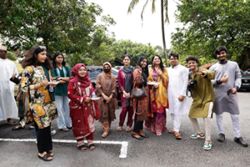
(Seated, from left) Pen, Khairussaleh, Kao, Zamzamzairani, Heng and Maybank Cambodia board of directors member Dr Sok Siphanna at the launch of the new silk weaving training centre in Siem Reap, Cambodia.
MAYBANK has opened its second silk weaving training centre in Siem Reap, Cambodia.
Located in Banteay Srey district, the new training centre is part of Maybank’s continued regional initiatives to provide business opportunities and empower underprivileged women weavers and mulberry farmers to become financially independent.
The grand opening ceremony was officiated by Maybank and Maybank Foundation chairman Tan Sri Zamzamzairani Mohd Isa and Asean secretary-general Dr Kao Kim Hourn.
Those in attendance included Cambodian culture and fine arts ministry state secretary Pen Monimakara, Siem Reap provincial council member Nasiet Ismael, National Bank of Cambodia deputy director general Heng Bomakara, women’s affairs ministry state undersecretary Koung Sorita, Maybank Group president and chief executive officer Datuk Khairussaleh Ramli, Maybank Cambodia chief executive officer and country head Rath Sophoan, and Maybank chief sustainability officer Shahril Azuar Jimin along with Maybank board of directors.
Zamzamzairani said the second silk weaving training centre was another milestone for the Maybank Women Eco-Weavers programme in Cambodia, which aimed to help Cambodian women achieve economic independence as well as to preserve the country’s weaving heritage.
“One of our sustainability goals is to improve the lives of two million households across Asean by 2025.
“We recognise that to ensure the prosperity of more women in this region, we need to continue creating a learning environment that is conducive to growth.
“This new centre was completed in 2020 amid a global health crisis and although plans for an official launch were put on hold, that had not deterred us from ensuring that our weavers’ progress continued,” he added.
The new centre serves as a platform to deliver vocational training and entrepreneurship opportunities.
It specifically benefits disadvantaged young women who may otherwise be tempted to seek employment either in the city or abroad in potentially harsh labour conditions.
The course rolls out 25 trainees at a time over a five-month training period facilitated by specialists.
Upon graduation, the new community of women weavers will bring the provided weaving looms back to their homes and commence production.
So far, 178 weavers have graduated from the facility and gained financial independence for themselves and their families.
A mini gallery was opened in the back area of the training centre.
Rows of handwoven products like garments, fabrics, bags and pouches are on display there for sale.
The weavers are able to gain supplementary income from the sales of these items.
“The work that goes on at the Maybank Silk Weaving Training Centre is not limited to safeguarding Cambodia’s heritage.
“The programme adopted a circular approach to its textile production by providing aid to farmers planting mulberry trees that will support the production of raw silk for our weavers.
“The farmers are taught the meticulous process of mulberry cultivation and silkworm rearing. The products are then marketed directly by our programme partner,” said Zamzamzairani.
The new building offers an open and spacious learning area with a small garden courtyard in the middle.
It is able to accommodate up to 25 weavers during their training sessions.
Adding to the festivity of the opening ceremony was the weavers’ graduation ceremony to recognise graduates from the previous eight batches.
Guests were treated to a tour of the facility where they witnessed weaving demonstrations.
In 2016, Maybank established its first silk weaving centre in Takeo province.
Now operating in its eighth year, the Takeo centre has produced 356 graduates who are now earning an average monthly income of US$350 (RM1,589).
The Maybank Women Eco-Weavers programme has trained 1,470 weavers and supported 1,300 farmers who have grown 340,000 mulberry trees.










































